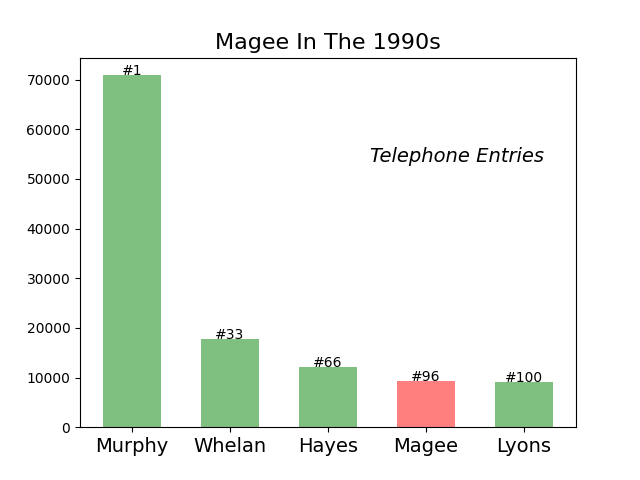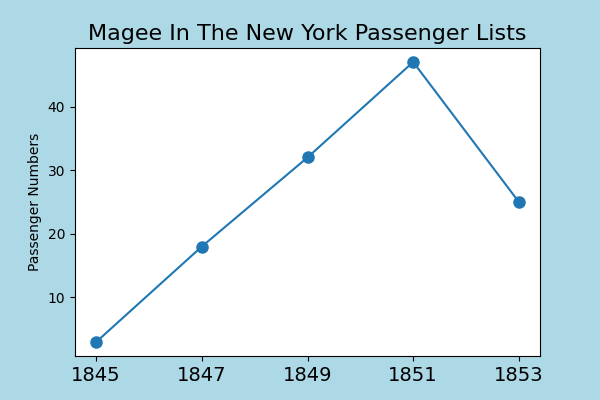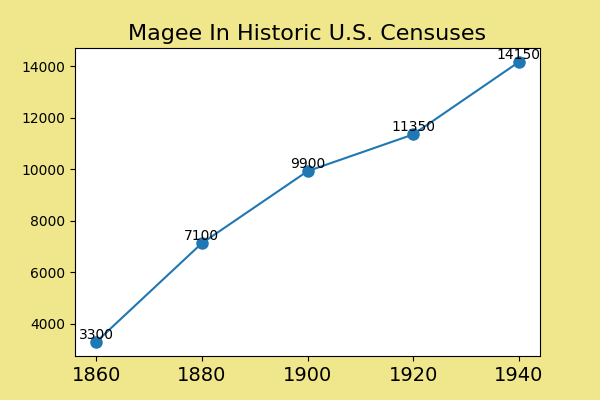This article looks at how common Magee is as a last name in Ireland and the United States from the 19th century to the present day.
You’ll learn the meaning and origins of the Magee surname while exploring some notable and famous people that held it.
I use census records, emigration lists, and military archives to uncover fascinating patterns. If you’re studying your genealogy, check out my sources at the end of the post so you can do your own research.
How Common Is Magee As A Surname In Ireland?
The Irish government doesn’t publish detailed surname statistics for recent years. The best that they give us is the ten most common surnames of babies born in the previous year. Magee
Thankfully, an Irish genealogist named Seán Murphy studied the names in national phone books published in the 1990s. His estimates aren’t as accurate as a census, but they are still a good way to get an estimate of numbers.
Magee was ranked 96 in the top one hundred names in this decade with a total of 9,300 entries.
This graphic shows how it ranks compared to the 1st, 33rd, 66th, and 100th entries in the survey:

Magee In The Early 1900s
The only complete Irish censuses that are available to the general public are those from the years 1901 and 1911. They offer two detailed snapshots of the population.
So, let’s focus on the early 1900s.
I used online archives to calculate the total numbers by surname. I consider these estimates due to some percentage of transcription errors. So, I’ve rounded the numbers to the nearest fifty.
There were 5,100 residents named Magee on the island in 1911.
Ten years earlier, Magee had about 5,350 residents in the 1901 census.
Population Estimates In The 1890s
A study of Irish surnames was conducted in 1890 by the head of the Civil Registrations Office. It was published as a “Special Report on Surnames In Ireland.”
The survey estimated that there were about 8,600 people named Magee in the country.
Emigration To America After The Irish Famine
The Irish have historically emigrated to Britain, the United States, Canada, and Australia. They were motivated by multiple factors, including social unrest, economic desperation, and hunger.
The largest wave of emigration to the United States occurred during the 19th century. The peak was in response to the Great Irish Famine, which took place between 1845 and 1852. A plant disease devastated the main food and income crop for much of the population.
I reviewed the Magee name in the shipping passenger lists arriving in New York during this period. The departures were from both Ireland and England.
This picture shows how the numbers rose and fell in the years after the famine:

How Common Is Magee As A Last Name In The U.S.?
Based on the 2010 U.S. census, the name Magee ranks about 1,284 among Irish names in America with 27,720 bearers.
Although the 2010 census has exact numbers and rankings, the rank I assign here is my estimate. If you’re curious about how I got there, here’s a brief explanation…
Estimating Rank In The United States
Historically, some Irish families with Gaelic surnames took English-sounding names as translations under the influence of colonization.
As these names also have English origins, they will have been brought to the United States by both British and Irish immigrants. Because the census doesn’t ask about specific European origin (e.g. England vs Ireland), it’s impossible to identify the proportion with Irish heritage.
I reviewed the census to identify which names are predominantly Irish in origin. In order to estimate the relative rankings of “Irish” names, I’ve mostly excluded surnames that have varying origins.
Magee In Historic Times
In a country as young as the United States, tracking the popularity of a surname over time can be fascinating. This reflects other demographic shifts across the country in addition to immigration. Higher child mortality rates and longer life expectancy are just two factors.
The historic census records have been transcribed and digitized. I used online archives to run counts of surname populations.
But the totals can’t be exactly accurate due to transcription errors. So, I’ve rounded the numbers to the nearest 50 in the graph below.
This picture shows the numbers every twenty years from 1860 to 1940:

These are the numbers in the graph:
- 1860: 3,300
- 1880: 7,100
- 1900: 9,900
- 1920: 11,350
- 1940: 14,150
Magee In World War II
About 8.3 million men and women enlisted in the U.S. Army during the Second World War. Many were of Irish heritage, and some were born in Ireland.
There were registration records for 866 soldiers named Magee who enlisted between 1938 and 1946.
There were 13 who were born in Ireland.
Magee Surname: Meaning And Origin
Magee comes from the Gaelic surname Mac Aodh. The term “Mac” means “son of” in Irish, so the name literally means “son of Aodh”.
The term “Aodh” means “fire” and was a personal name associated with Irish supernatural legends. In one such legend, Aodh is a god of the Underworld.
In another, he was one of the children of Lir (a god of the sea). The children were cursed and turned into swans. They lived as swans for nine hundred years before a monk restored their human form.
Famous Or Historic People Named Magee
Here are some notable people with the family name:
- Walter Magee (1861 – 1927): American politician from New York who won election seven times to the House of Representatives.
- William Magee (1873 – 1938): a Pittsburgh mayor who introduced automobiles for the city police force and brought in prohibition.
- Jimmy Magee (1935 – 2017): born in New York to Irish parents, his family returned to County Louth when he was a child. As a sports commentator, he became one of the most recognized voices in Ireland.
Sources

External Research
The Ireland 1990s estimates are from Seán J. Murphy’s research paper.
The population estimates of 1890 are based on the “Special Report on Surnames in Ireland“, published in 1909.
The population figures for the 2010 U.S. Census come from a file provided by the U.S. Census Bureau.
Internal Research
Some of the population numbers are based on my own research and calculations using online archives. I’ve rounded those numbers to the nearest 50 to account for transcription errors and other technical issues with online databases of this type.
The Irish census estimates for 1901 and 1911 are my calculations based on the Irish National Archives
I plotted the emigration figures from 1845 to 1854 based on calculations from the archives of the New York Passenger Lists (1820-1957).